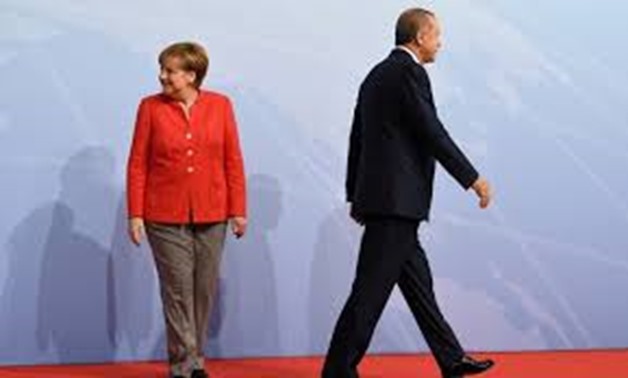
FILE PHOTO: German Chancellor Angela Merkel greets Turkey's President Recep Tayyip Erdogan at the beginning of the G20 summit in Hamburg, Germany, July 7, 2017. REUTERS/Bernd Von Jutrczenka/POOL/File Photo
ANKARA/BERLIN - 12 September 2017: Chancellor Angela Merkel said on Tuesday Germany would only restrict some arms sales to Turkey, softening an earlier announcement of a freeze on major arms sales after Ankara said that would hurt their joint fight against Islamic State.
Merkel spoke a day after Foreign Minister Sigmar Gabriel said Berlin had put all major arms exports to NATO partner Turkey on hold, citing deteriorating human rights there and strained diplomatic ties.
She told broadcaster NDR that Germany would decide on arms sales requests from Turkey on a case-by-case basis, noting that Berlin cooperated with Ankara on security matters. "We also remain in a joint fight against Islamic State," Merkel said.
The countries' ties through the U.S.-led military alliance have come under pressure since Turkish President Tayyip Erdogan started a crackdown on political opponents after a failed coup last year.
Germany has criticised mass arrests in Turkey, refused to extradite people Turkey says were involved in the putsch, and demanded the release of around a dozen German or Turkish-German citizens arrested in recent months.
This month, Merkel went as far as saying she would seek to end Turkey's membership talks with the European Union - drawing accusations from Turkey that she was flirting with populism to build support before Sept. 24 elections.
BOMBS, TORPEDOES, MISSILES
Merkel did not give details on what criteria Germany would use to make its case-by-case decisions on arms exports.
But in a written response to a question from Greens lawmaker Ozcan Mutlu about German arms exports to Turkey, Economy Ministry state secretary Matthias Machnig said they would not be approved if Berlin suspected they could be used for repression.
Machnig's written response, dated Sept. 7, also showed arms sales to Turkey had declined significantly since a year earlier.
He listed arms exports to Turkey approved between Jan. 1 and Aug. 31 this year - primarily bombs, torpedoes and missiles with some small arms and munitions - worth a total of about 25 million euros ($29.84 million), down from 69 million euros in the same period last year.
Before Merkel spoke, Turkish EU Affairs Minister Omer Celik criticised the announcement of a total ban by Gabriel, who is from the centre-left Social Democrats (SPD), junior partners in Merkel's coalition.
"This decision will weaken Turkey's fight against terrorism, and weakening the Turkish fight would mean making Europe's future more vulnerable," he said. "Germany must leave security issues out of political discussions."
A NATO spokesman said the alliance has no role in commercial arms sales between member states.
"It does not monitor, promote or facilitate such transactions," the spokesman added.

Comments
Leave a Comment